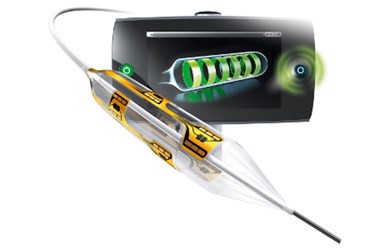Boston Scientific Resumes Renal Denervation Trials, Broadens Participant Pool

Boston Scientific has enrolled the first of 100 patients in REDUCE-HTN: REINFORCE, a new clinical trial to test its renal denervation system, Vessix. The company believes that by studying a broader pool of participants, it can answer some questions that have stymied other renal denervation studies.
Renal denervation technology (RDT) is targeted at cases of chronic hypertension that are resistant to pharmaceutical intervention, and works by selectively disabling renal nerves with radio frequency and blocking the mechanisms that cause blood vessels to constrict.
While supported by many experts in theory, RDT systems have yet to produce conclusive results in clinical trials. As yet, no system has been approved by the FDA for clinical use in the U.S.
The principal investigators of the Boston Scientific study believe that variables in medications and high-risk patients clouded results of previous investigations. In a recent press release, they announced their intention to study a broader range of hypertensive patients in hopes of shedding light on the true efficacy of renal denervation.
“Previous results of renal denervation studies have been affected by a focus on patients with the difficult-to-define condition of treatment resistant hypertension, made even more complex by uncertainties regarding their use of hypertension medications. We need to find clarity, and we believe this innovative study design will enable us to do so,” said Michael Weber, co-principal investigator and professor of medicine at the State University of New York (SUNY).
Boston Scientific’s proposed study will look at 100 patients who are not on medication, and will focus primarily on the mean reduction in average 24-hour ambulatory systolic blood pressure at eight weeks post randomization.
The Vessix system, acquired by Boston Scientific in 2012, uses a multi-electrode bipolar catheter and balloon-based approach, and treatment time is approximately 30 seconds. The system is already approved for sale in Australia, New Zealand, Europe, the Middle East, and certain Asian markets.
Boston Scientific projected that the first results from the new study would be available in early 2016.
Both Medtronic and Boston Scientific have made good on their promises to renew efforts to study RDT and are ahead of the schedule projected by Forbes in February.
Earlier this month, Medtronic announced that it had begun enrolling patients in a newly redesigned trial, which will involve 200 patients, both those receiving medication and those who are not, to compare results from both groups.
ReCor Medical, a startup based in California and Amsterdam, also announced that it has received a $15 million dollar investment from Otsuka Holdings to begin an investigation of its RDT technology, which will be conducted in the U.S. and Europe.
According to CDC estimates, 70 million American suffer from chronic hypertension, and over half of those cases are resistant to drugs. If left uncontrolled, hypertension can induce potentially fatal conditions such as atrial fibrillation, stroke, heart failure and kidney failure.
A recent article in the Minneapolis Star Tribune cited analysts who say there is a projected multi-billion dollar global market waiting for clinically proven RDT systems.
Image credit: Boston Scientific
